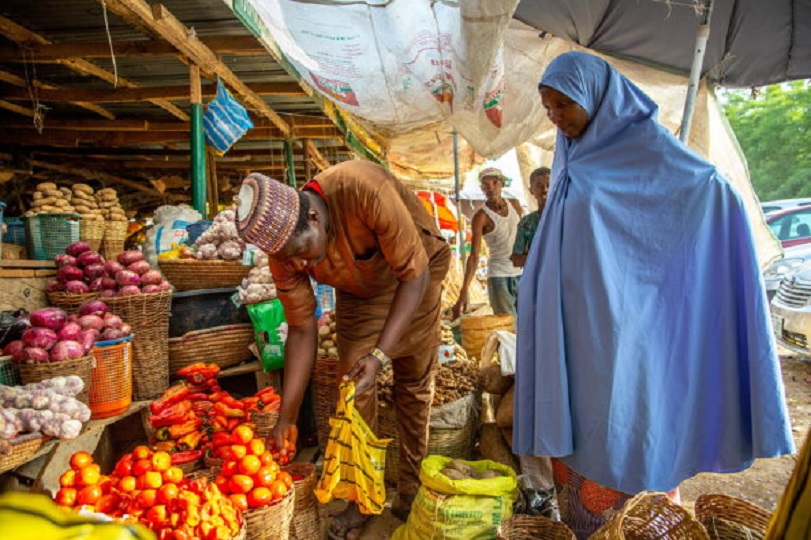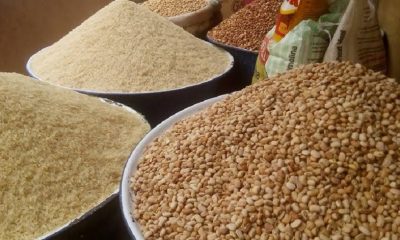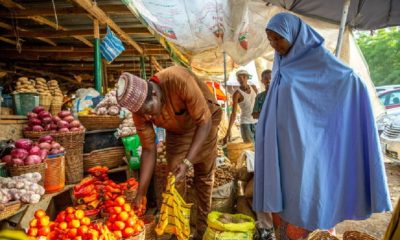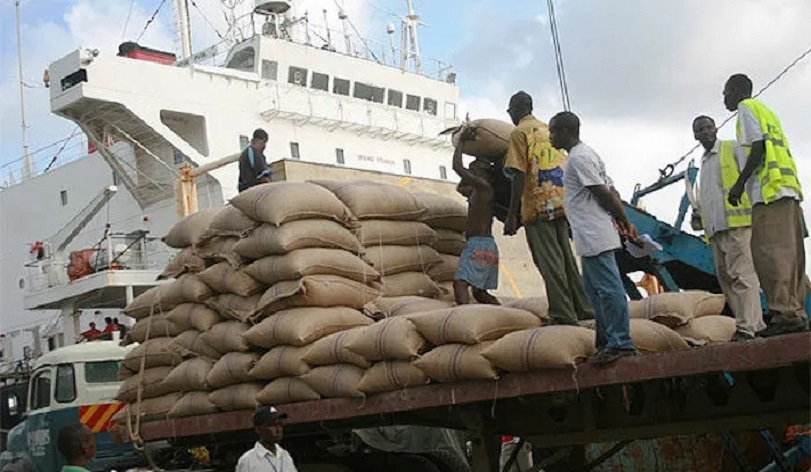Economy
World Food Prices Drop 20% From One Year Peak

By Adedapo Adesanya
World food prices have fallen for the 12th month in a row, now down 20 per cent from a one-year peak in March, according to the latest data from the Food and Agriculture Organisation (FAO).
The FAO Food Price Index (FFPI) averaged 126.9 points in March 2023, down 2.8 points (2.1 per cent) from February.
During the past 12 months since March 2022, the index has fallen by as much as 32.8 points (20.5 per cent).
The decline in the index in March was led by drops in the cereal, vegetable oil and dairy price indices, while those of sugar and meat increased.
The FAO Cereal Price Index averaged 138.6 points in March, down 8.2 points (5.6 per cent) from February and 31.6 points (18.6 per cent) below its one year ago.
This month’s decrease reflects a fall in international prices of all major cereals. International wheat prices fell the most, by 7.1 per cent, driven by ample global supplies and strong competition among exporters.
The extension of the Black Sea Grain Initiative, allowing Ukraine to continue to export from its Black Sea ports, also contributed to the decline.
Higher estimates for Australia’s production, along with improved crop conditions in the European Union this month, boosted the global supply outlook further. Strong competition from the Russian Federation, where high supplies continue to support competitive prices, also sustained the downward pressure on markets.
World maize prices also fell, by 4.6 per cent, in March, pressured by seasonal availability from harvests in South America, expectations of record output in Brazil, and the extension of the Black Sea Grain Initiative.
Among other coarse grains, world prices of barley and sorghum declined by 6.7 per cent and 5.7 per cent, respectively, influenced by spillover from weakness in international maize and wheat markets.
International rice prices eased by 3.2 per cent in March, weighed by ongoing or imminent harvests in major exporting countries, including India, Viet Nam and Thailand.
The FAO Vegetable Oil Price Index averaged 131.8 points in March, down 4.1 points (3.0 per cent) from February and standing as much as 47.7 per cent below its level a year ago.
The decrease in the index was the net result of lower soy, rapeseed and sunflower oil quotations more than offsetting higher world palm oil prices.
After falling for three consecutive months, international palm oil prices rebounded in March. Besides lower output levels in Southeast Asia due to unfavourable weather and floodings in some growing regions, palm oil prices received further support from limited global exportable supplies amid temporary export restrictions imposed by Indonesia.
By contrast, world soy oil prices continued to fall, following the trend of lower international soybean quotations. In the meantime, rapeseed and sunflower oil prices also kept declining, underpinned by, respectively, ample world supplies and subdued global import demand.
The FAO Dairy Price Index averaged 130.3 points in March, down 1.1 points (0.8 per cent) from February and standing 15.6 points (10.7 per cent) below its level in the corresponding month a year ago.
The decline in March was driven by lower price quotations for cheese and milk powders, while butter prices increased.
The decline in the international price quotations for cheese was underpinned by slower purchases by most leading importers in Asia amid increased export availabilities, including inventories, in leading exporters.
Milk powder prices fell for the ninth consecutive month, primarily reflecting sluggish import demand, especially for near-term deliveries, and seasonally rising milk production in Western Europe.
By contrast, butter prices increased due to solid import demand, especially from North and Southeast Asian countries, for supplies from Oceania, where seasonally falling milk production tracked slightly below trend levels.
The FAO Meat Price Index* averaged 113.0 points in March, slightly up (0.9 points and 0.8 per cent) from February but down 6.3 points (5.3 per cent) from one year ago.
In March, price quotations for bovine meat increased, influenced by rising internal prices in the United States of America, where cattle supply is expected to be lower in the months ahead.
Pig meat prices increased slightly, mainly due to higher prices in Europe on the continued supply limitations and increased pre-Easter demand.
By contrast, poultry meat prices fell for the ninth successive month on subdued global import demand, despite supply challenges amid widespread avian influenza outbreaks in several large exporting countries.
Ovine meat prices also averaged lower, reflecting a downward adjustment from the high prices registered in February, driven by increased pre-Easter demand and the impact of exchange rate movements.
The FAO Sugar Price Index averaged 127.0 points in March, up 1.8 points (1.5 per cent) from February, marking the second consecutive monthly increase and reaching its highest level since October 2016.
The increase in prices mostly resulted from concerns over lower global availabilities of sugar in the 2022/23 season, following declining production prospects in India, Thailand and China.
However, the positive outlook for the sugarcane crops in Brazil, about to be harvested, limited the upward pressure on world sugar prices.
The decline in international crude oil prices, encouraging greater use of sugarcane to produce sugar in Brazil, coupled with the weakening of the Brazilian Real against the United States Dollar, contributed to limiting the month-on-month increase in world sugar prices.
Despite the fall in the global price of food commodities, domestically, factors like inflation, weakening currencies, and other factors, including taxes and hikes in interest rates, are making them expensive.
Economy
FG Targets Credit Access For 50% Workers By 2030

By Adedapo Adesanya
The Vice President, Mr Kashim Shettima, inaugurated the Board of the Nigerian Consumer Credit Corporation (CREDICORP) and gave a 50 per cent access target for workers, saying consumer credit was critical to Nigeria’s ambition of becoming a one-trillion-dollar economy by 2030.
According to him, President Bola Tinubu established the CREDICORP to build a trusted credit infrastructure, provide catalytic capital to lower borrowing costs, and help Nigerians overcome long-standing cultural resistance to credit.
Speaking on Thursday in Abuja when he inaugurated the board on behalf of the President, the Vice President, in a statement by his spokesman, Mr Stanley Nkwocha, said that the quality of life of Nigerians cannot improve without closing the gap between access to capital and human dignity.
“A civil servant who earns honestly does not have to chase sudden wealth just to buy a vehicle, or save for ten years to buy one. A young professional should not remain in darkness simply because solar power must be paid for all at once,” the Vice President said.
VP Shettima disclosed that in just one year of operations, CREDICORP has disbursed over ₦37 billion in consumer credit to more than 200,000 Nigerians, with over half of them accessing formal credit for the first time.
The Vice President said the organisation was specifically tasked with building credit infrastructure to bridge the trust gap between lenders and borrowers, providing wholesale capital and credit guarantees through its portfolio company.
“Ultimately, these critical jobs of CREDICORP will enable access to consumer credit to at least 50 per cent of working Nigerians by 2030,” he said.
The Vice President explained that the new board’s role was not ceremonial as they are custodians of the organisation’s mission, adding that the long-term strength of the institution would depend on their “vigilance, integrity, sacrifice, and commitment.”
He directed Board members to uphold Public Service Rules, the Board Charter, and all applicable governance frameworks, warning that accountability and stewardship of public resources were non-negotiable.
The Chairman of CREDICORP, Mr Aderemi Abdul, expressed appreciation to President Tinubu for his vision behind the formation of CREDICORP and for the confidence reposed in them, noting that the establishment of the corporation marked an important step towards strengthening the nation’s financial architecture.
He assured President Tinubu that the board understands its responsibility and will guide the institution to deliver meaningful benefits to Nigerians.
For his part, Mr Uzoma Nwagba, Managing Director/CEO of CREDICORP, recalled watching President Tinubu say 20 years ago that consumer credit is one of the major tools that will improve the lives of Nigerians.
He noted that over the past 18 months, the institution has benefited more than 200,000 Nigerians, including students.
He assured that the presidential vision behind CREDICORP would not be taken lightly, as the team considers their appointments a unique, once-in-a-lifetime opportunity.
Other members of the board inaugurated include Mrs Olanike Kolawole, Executive Director, Operations; Mrs Aisha Abdullahi, Executive Director, Credit and Portfolio Management; Mr Armstrong Ume-Takang (MD, MoFI), Representative of MoFI; Mrs Bisoye Coke-Odusote (DG, NIMC), Representative of NIMC; and Mr Mohammed Naziru Abbas, Representative of FMITI.
Others are Mr Marvin Nadah, Representative of FCCPC; Mrs Chinonyelum Ndidi, Representative of the Federal Ministry of Finance; Mr Mohammed Abbas Jega, Independent Director; and Mrs Toyin Adeniji, Independent Director.
Economy
NASD OTC Exchange Rallies 0.23% as Nipco Leads Six Advancers

By Adedapo Adesanya
Six price gainers helped the NASD Over-the-Counter (OTC) Securities Exchange retain its stay in green territory after a 0.23 per cent appreciation on Thursday, February 26.
The price gainers were led by Nipco Plc, which added N25.00 to close at N278.00 per share compared with the previous day’s N253.00 per share, NASD Plc rose by N5.13 to N56.41 per unit versus N51.28 per unit, FrieslandCampina Wamco Nigeria Plc expanded by N2.24 to N102.44 per share from N100.00 per share, Afriland Properties Plc grew by 88 Kobo to N18.88 per unit from N18.00 per unit, 11 Plc increased by 35 Kobo to N277.00 per share from N276.65 per share, and Lagos Building Investment Company (LBIC) Plc gained 27 Kobo to close at N3.75 per unit versus N3.48 per unit.
On the flip side, Central Securities Clearing System (CSCS) Plc lost N1.75 to sell at N68.25 per share versus N70.00 per share, and Geo-Fluids Plc depreciated by 2 Kobo to N3.25 per unit from N3.27 per unit.
The weight of the advancers fortified the NASD Unlisted Security Index (NSI) by 9.21 points to 4,034.46 points from 4,025.25 points, and the market capitalisation soared by N5.51 billion to N2.413 trillion from Wednesday’s N2.408 trillion.
Yesterday, the transaction value jumped by 18.8 per cent to N102.8 million from N80.7 million, and the number of deals surged by 18,8 per cent to 38 deals from 32 deals, while the transaction volume went down by 84.9 per cent to 1.3 million units from 8.7 million units.
At the close of business, CSCS Plc was the most traded stock by value (year-to-date) with 34.2 million units worth N2.04 billion, followed by Okitipupa Plc with 6.3 million units sold for N1.1 billion, and Geo-Fluids Plc with 122.1 million units valued at N478.2 million.
Resourcery Plc remained as the most traded stock by volume (year-to-date) with 1.05 billion units exchanged for N408.7 million, trailed by Geo-Fluids Plc with 122.1 million worth N478.2 million, and CSCS Plc with 34.2 million units traded for N2.04 billion.
Economy
Naira Down Again at NAFEX, Trades N1,359/$1

By Adedapo Adesanya
The Naira further weakened against the Dollar in the Nigerian Autonomous Foreign Exchange Market (NAFEX) for the fourth straight session this week on Thursday, February 26.
At the official market yesterday, the Nigerian Naira lost N3.71 or 0.27 per cent to trade at N1,359.82/$1 compared with the previous session’s N1,356.11/$1.
In the same vein, the local currency depreciated against the Pound Sterling in the same market window on Thursday by N8.27 to close at N1,843.23/£1 versus Wednesday’s closing price of N1,834.96/£1, and against the Euro, it crashed by N8.30 to quote at N1,606.89/€1, in contrast to the midweek’s closing price of N1,598.59/€1.
But at the GTBank forex desk, the exchange rate of the Naira to the Dollar remained unchanged at N1,367/$1, and also at the parallel market, it maintained stability at N1,365/$1.
The continuation of the decline of the Nigerian currency is attributed to a surge in foreign payments that have outpaced the available Dollars in the FX market.
In a move to address the ongoing shortfall at the official window, the Central Bank of Nigeria (CBN) intervened by selling $100 million to banks and dealers on Tuesday.
However, the FX support failed to reverse the trend, though analysts see no cause for alarm, given that the authority recently mopped up foreign currency to achieve balance and it is still within the expected trading range of N1,350 and N1,450/$1.
As for the cryptocurrency market, major tokens posted losses over the last 24 hours as traders continued to de-risk alongside equities following Nvidia’s earnings-driven pullback, with Ripple (XRP) down by 2.7 per cent to $1.40, and Dogecoin (DOGE) down by 1.6 per cent to $0.0098.
Further, Litecoin (LTC) declined by 1.3 per cent to $55.87, Ethereum (ETH) slipped by 0.9 per cent to $2,036.89, Bitcoin (BTC) tumbled by 0.7 per cent to $67,708.21, Cardano (ADA) slumped by 0.6 per cent to $0.2924, and Solana (SOL) depreciated by 0.4 per cent to $87.22, while Binance Coin (BNB) gained 0.4 per cent to sell for $629.95, with the US Dollar Tether (USDT) and the US Dollar Coin (USDC) closing flat at $1.00 each.
-

 Feature/OPED6 years ago
Feature/OPED6 years agoDavos was Different this year
-
Travel/Tourism10 years ago
Lagos Seals Western Lodge Hotel In Ikorodu
-

 Showbiz3 years ago
Showbiz3 years agoEstranged Lover Releases Videos of Empress Njamah Bathing
-

 Banking8 years ago
Banking8 years agoSort Codes of GTBank Branches in Nigeria
-

 Economy3 years ago
Economy3 years agoSubsidy Removal: CNG at N130 Per Litre Cheaper Than Petrol—IPMAN
-

 Banking3 years ago
Banking3 years agoSort Codes of UBA Branches in Nigeria
-

 Banking3 years ago
Banking3 years agoFirst Bank Announces Planned Downtime
-

 Sports3 years ago
Sports3 years agoHighest Paid Nigerian Footballer – How Much Do Nigerian Footballers Earn




















